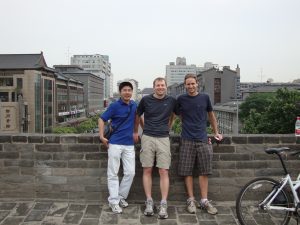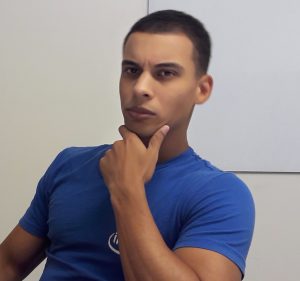 The PROOFS workshop is held annually alongside CHES and CRYPTO with the goal of “promoting methodologies that increase the confidence level in the security of embedded systems, especially those which contain cryptographic algorithms”. Ryan was invited to give a keynote talk on hardware security design tools. This year the workshop was held at UC Santa Barbara, which gave Ryan the opportunity to visit his old stomping grounds (he was a professor there from 2002-2007). If you are interested, you can use the Internet “Wayback Machine” and see our old research group’s website. The painting is of UCSB Campus Point. It hangs on the wall in Ryan’s house.
The PROOFS workshop is held annually alongside CHES and CRYPTO with the goal of “promoting methodologies that increase the confidence level in the security of embedded systems, especially those which contain cryptographic algorithms”. Ryan was invited to give a keynote talk on hardware security design tools. This year the workshop was held at UC Santa Barbara, which gave Ryan the opportunity to visit his old stomping grounds (he was a professor there from 2002-2007). If you are interested, you can use the Internet “Wayback Machine” and see our old research group’s website. The painting is of UCSB Campus Point. It hangs on the wall in Ryan’s house.
Monthly Archives: August 2016
New Method for Hardware Trojan Detection
 Hardware Trojans are tiny pieces of circuitry that hide amongst millions, or even billions of transistors. They lay dormant until some hard to detect trigger springs them into action. Then the start their malicious behaviors like draining power or leaking secret information. The are by design difficult to detect, but our recent research shows that information flow tracking is a useful way to find and eliminate them. The research was a cover feature for the August issue of IEEE Computer. The paper’s authors are Kastner Research Group (KRG) Postdoc Wei Hu, Computer Science and Technology Ph.D. candidate Baolei Mao of Northwestern Polytechnical University (and former KRG visiting graduate student), Tortuga Logic CEO Jason Oberg, and CSE Professor Ryan Kastner. Three of the four authors (Baolei is missing) are shown a couple years ago taking in the sites at Xi’an.
Hardware Trojans are tiny pieces of circuitry that hide amongst millions, or even billions of transistors. They lay dormant until some hard to detect trigger springs them into action. Then the start their malicious behaviors like draining power or leaking secret information. The are by design difficult to detect, but our recent research shows that information flow tracking is a useful way to find and eliminate them. The research was a cover feature for the August issue of IEEE Computer. The paper’s authors are Kastner Research Group (KRG) Postdoc Wei Hu, Computer Science and Technology Ph.D. candidate Baolei Mao of Northwestern Polytechnical University (and former KRG visiting graduate student), Tortuga Logic CEO Jason Oberg, and CSE Professor Ryan Kastner. Three of the four authors (Baolei is missing) are shown a couple years ago taking in the sites at Xi’an.
Links: IEEE Computer Article, UCSD Press Release, UCSD CSE news article, QI Press Release, JSOE Press Release, Cyberwire, eWeek
SIGHPC/Intel Computational and Data Science Fellowship
 Michael Barrow was one of 14 students awarded the new SIGHPC/Intel fellowship. ACM’s Special Interest Group on High Performance Computing (SIGHPC), in collaboration with Intel, established the fellowship to increase the diversity of students pursuing graduate degrees in data science and computational science, including women as well as students from racial/ethnic backgrounds that have not traditionally participated in the computing field. The fellowship starts in August, but Mike will be recognized during the high performance computing community’s flagship Super Computer (SC) conference this November. Mike’s research focuses on developing high performance vision systems to aid surgeons during operations.
Michael Barrow was one of 14 students awarded the new SIGHPC/Intel fellowship. ACM’s Special Interest Group on High Performance Computing (SIGHPC), in collaboration with Intel, established the fellowship to increase the diversity of students pursuing graduate degrees in data science and computational science, including women as well as students from racial/ethnic backgrounds that have not traditionally participated in the computing field. The fellowship starts in August, but Mike will be recognized during the high performance computing community’s flagship Super Computer (SC) conference this November. Mike’s research focuses on developing high performance vision systems to aid surgeons during operations.